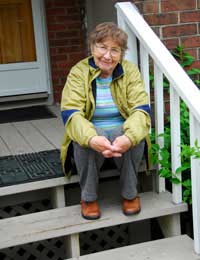Supported Housing Schemes

For those who are elderly, disabled or have mental health problems, being able to live independently is often really important. Through supported housing it’s possible for many disabled people to live independently, while still receiving the care and support that they need.
There is a wide variety of supported housing available, covering all levels of need. This article will focus on supported housing to facilitate independent living so it doesn’t cover residential care homes which are covered elsewhere on this site.
Outreach Support Housing
Outreach support housing usually means a group of council or housing association flats which are allocated to local support workers. These support workers will visit residents at home regularly, and provide both practical and emotional support.Residents who live in this type of housing can usually live fairly independent lives and don’t have very high support needs.
The cost of outreach support housing is usually in line with general council and housing association rental rates. It’s common for tenants in outreach support housing to receive Housing Benefit or other income-assessed benefits. Living in outreach support housing will not affect any entitlement to benefits.
Hostels
Hostels offer short-term care, usually for homeless people or those with mental health problems. Hostels will often specialise in a certain group of people, whether it be the homeless or those with a particular mental health problem. This type of supported housing may cater for anything from 4 to 30 people per night.Some hostels are men or women only. At some hostels those in need will just be able to turn up, but others are referral only, meaning residents must be referred by a health professional or social worker.
Hostels may be run privately, or by Local Authorities, charities or other voluntary organisations. As hostels don’t offer personal care they don’t have to be registered.
The cost of hostels varies, but as a guide you can expect to pay from £1 to £5 per night, and most do accept Housing Benefit and can advise residents on applying for it.
Sheltered Housing
Sheltered housing allows those with some support needs to live independently, while also having the security of access to help when they need it.Unlike outreach support housing for example, with sheltered housing a support worker or warden actually lives on the premises.
Sheltered housing schemes are available to people with varying levels of care needs. Residents of sheltered housing schemes can either be tenants or homeowners. This costs will vary depending on the specifics and location of the accommodation. Housing Benefit and other benefits will usually be accepted though. Some sheltered housing schemes will charge an extra fee, on top of rental, to cover staff costs and maintenance.
If you are researching sheltered housing schemes and the cost involved, always make sure you get a clear idea of what is and what isn’t included in any fees quoted. More information on Sheltered Housing is available in our article ‘Sheltered Housing’.
Your GP or social worker will be able to advise you on the best type of supported housing for you and how to apply for it.
- Shock Report Reveals NHS Elderly Care Failings
- Complaining About a Care Home: Top Ten Tips
- Why the Elderly Are Being Punished by the Care Lottery
- Tips on Choosing a Care Home
- What Are Community Care Assessments?
- What is Extra Care Housing and How is it Funded?
- Employing a Carer
- Will My Family Have to Pay for My Care?
- Immediate Care Needs Plan
- Fully Funded NHS Care
- Choosing a Care Home
- Your Contribution to Care Home Fees
- Paying for Care Yourself
- Types of Care Home
- The Cost of Care Homes
- Respite Care Options
- Help with Nursing Care Costs


Re: Coping With the Stress of Caring for a Disabled Spouse
My husband has declined so quickly that he needs handicapped parking now and he was mowing the…
Re: Coping With the Stress of Caring for a Disabled Spouse
I'm recently disabled due to a neurological disorder and I have been deteriorating rather…
Re: Coping With the Stress of Caring for a Disabled Spouse
We are all here for the same reason. Why does life have to be this way. It’s sad. I wish things…
Re: Disabled: Can I Claim Funding for a Cooker?
Hi. I’m disabled with bad back knees and hips and carpal tunnel in both hands. I also have fibromyalgia. I was…
Re: Coping With the Stress of Caring for a Disabled Spouse
I have been married to my wife for 31 years. Beginning of our relationship was very volatile at…
Re: Coping With the Stress of Caring for a Disabled Spouse
We have been married for 40 years. I retired in 2019 looking forward to spending time enjoying…
Re: Coping With the Stress of Caring for a Disabled Spouse
My husband was diagnosed with ms 8 years ago his mobility has gone really bad to the extent that…
Re: Coping With the Stress of Caring for a Disabled Spouse
I thought I was getting down and desperate. My husband has had an illness for 20 yrs. now, but…
Re: Disabled: Can I Claim Funding for a Cooker?
Hi I’ve been moved into a wheelchair Bungalow which is fine But I need an Electric Hob and a Slide & Hide…
Re: Giving Away Assets to Avoid Paying for Care
The best way to avoid a psychological breakdown after experiencing or having to deal with infidelity is to make…